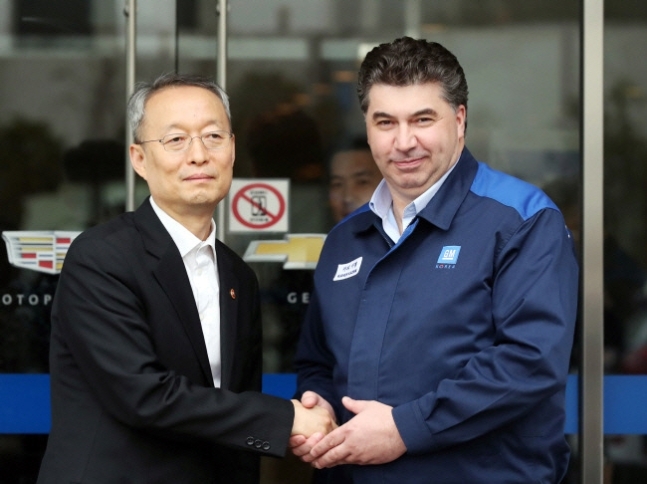General Motors has decided to set up its Asia-Pacific regional office in South Korea, among other measures to boost its operation here, while agreeing with the Seoul government on a $7.15 billion rescue plan to normalize business in the country, of which $750 million will come from Korea’s state-run bank, officials said Thursday.
The two sides reached the agreement, according to which GM will convert $2.8 billion owed by GM Korea into shares and extend loans worth $3.6 billion for the local unit for facility investment, South Korean Deputy Prime Minister and Finance Minister Kim Dong-yeon told reporters.
As for the government’s part, Korea Development Bank, which is the second-largest shareholder of GM Korea, will put in $750 million into GM’s loss-making unit by the end of this year, according to the deal signed by Kim and GM International President Barry Engle.
 |
| Paik Un-gyu, minister of trade, industry and energy, and Berry Engle, head of GM International, shake hands in front of GM Korea’s Bupyeong plant on April 6. (Yonhap) |
GM also agreed to maintain its stake in GM Korea over the next five years, ensuring its continued business in the country. It will be required to maintain its holding in GM Korea above 35 percent from 2023 to 2028, Kim added.
The deal also includes GM allocating two new vehicles to its Korean plants and giving the KDB veto power in major management decisions.
The agreement came after a monthslong dispute sparked by GM’s restructuring plan for the ailing Korea unit in February, which had included a shutdown of its Gunsan plant, prompting weeks of vehement opposition from the labor union and stoking concerns from the local community.
“The subsidies from the KDB take up slightly over 10 percent of the total funds. …We must take into consideration how we would have reacted if a different foreign-invested firm made such a scale of investment,” Kim said, mindful of mixed public reactions to injecting taxpayers’ money into the company.
“With this deal, we expect diverse benefits ranging from manufacturing output, experts, employment and the local economy,” he added.
In a separate but related deal with the Ministry of Trade, Industry and Energy, GM decided to set up its Asia-Pacific regional office in South Korea and expand purchases of car parts from Korean firms, with the signing of a memorandum of understanding between Trade Minister Paik Un-gyu and Engle.
The Detroit-based automaker also pledged to strengthen technology cooperation in developing and producing electric and self-driving automobiles.
“The setup of the Asia-Pacific regional office in Korea is evaluated as GM’s long-term commitment in the nation. The office is expected to serve a key role for long-term management stability and development of GM Korea here,” said Moon Seung-ok, chief of the Trade Ministry’s industry and enterprise innovation division.
The Asia-Pacific region includes Indonesia, Thailand, Malaysia, the Philippines, Vietnam, Singapore, Brunei, Myanmar and India. The size of the nine markets stood at around 6.7 million units last year while GM sold around a combined 45,500 units in the nine nations.
The Asia-Pacific regional office, excluding China, will be fostered as a key base of production, sales and technology development of GM automobiles in the region, the ministry said.
Singapore used to be GM’s Asia-Pacific regional office but the unit was combined with South America’s office last year after GM pulled its business out of Australia.
“The Asia-Pacific regional office means more like improving the status and functions of the Korean unit rather than increasing production volume. We plan to announce technical details around next week,” a GM official said.
Under the agreement, GM will actively utilize Korea’s research and development design center to push for the development of its future cars, including electric and self-driving cars. GM will also expand purchases of car parts from Korean companies for its global sales. It currently purchases car parts worth around 2 trillion won ($1.8 billion) annually from local parts firms.
Meanwhile, the government temporarily rejected last week GM Korea’s call for its Bupyeong plant and Changwon plant to be designated as foreign investment zones on the grounds that the firm’s investment plan did not meet the requirement.
By Shin Ji-hye (shinjh@heraldcorp.com)

